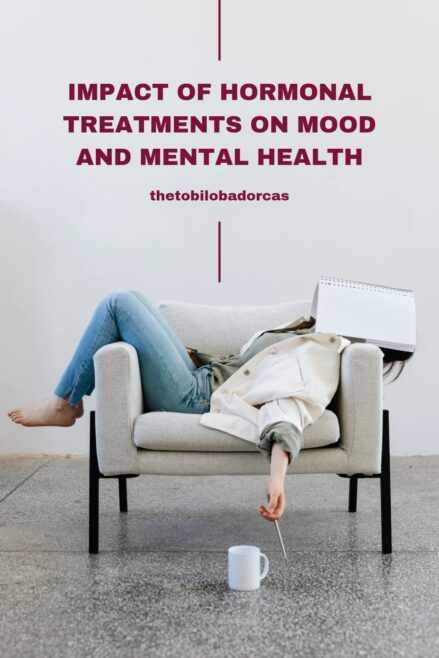Hormone treatments are important in treating hormone-sensitive breast cancers, especially estrogen-receptor-positive (ER-positive) tumors that account for 70% of all breast cancer cases. Post-surgical administration of tamoxifen, or one of the aromatase inhibitors (AIs) to lower estrogen levels and/or block estrogen receptors are standard therapy to prevent cancer recurrence. Yet as transformative and lifesaving as these therapies can be, their toll on mood and mental health is equally profound — if under-recognized.
In this blog, we will look at the psychological side effects that clients taking hormonal treatments may experience and how they impact mood states due to changing biological processes alongside strategies for dealing with mental health issues. That the discourse will shift about cancer care not only being about physical recovery but also recognizing that there are long term mental and emotional affects and we need to begin giving fair time toward survivorship.
Hormonal Treatments for Breast Cancer
Patients with hormone-sensitive breast cancers may got hormonal therapies including tamoxifen or aromatase inhibitors (such as letrozole, anastrozole, or exemestane) Such therapies reduce estrogen, a fuel for hormone receptor-positive cancers. While Tamoxifen blocks the estrogen receptors on breast cancer cells and can keep some endometrial tissue from growing, AIs decrease overall estrogen in postmenopausal women.
While these treatments lower the risk of recurrence and death, they are typically taken over extended periods (5-10 years) and can substantially affect a patient’s quality of life, particularly psychological health.

Biological Mechanisms Behind Mood Changes
Estrogen is commonly linked to reproductive role, however it can regulate mood and supports emotional stability. It works on production of neurotransmitters such as serotonin, dopamine and norepinephrine that are associated with reward behaviour, pleasure and mood leveling. A decrease in the estrogen can disturb this balance and result into the symptoms of depression, anxiety, mood swings etc.
Not only does tamoxifen block estrogen from binding to receptors on breast tissue, it also affects the estrogen receptors in the brain. Aromatase inhibitors likewise cause estrogen levels to plummet, and this can result in what is effectively a sudden transition from one hormonal environment to another for post-menopausal women. This shift in brain chemistry is thought to be responsible for many of the emotional side-effects affecting breast cancer survivors who are taking hormonal treatments.
Typical psychological side effects
- Depression: Many breast cancer survivors on hormonal therapy report depression. Studies show that depression is more likely to occur in women on long-term therapy with tamoxifen or aromatase inhibitors. The depression may be heightened as a result of having to live with cancer, the physical effects (including hot flashes and tiredness), and fear of recurrence. Survivors might also demonstrate depression in different ways, such as being more irritable or experiencing a lack of motivation towards once-enjoyed activities and even cognitive symptoms, for example memory lapses.
- Anxiety: Anxiety is yet another mental health issue with which breast cancer survivors on hormonal therapy may struggle. It could be a fear of the cancer coming back, anxiety over long‐term treatment and financial devastation; or it may be the ongoing side effects that take their toll. The treatment itself, which causes hormonal fluctuations in the body, can also bring on these emotions — sometimes as panic attacks or generalized anxiety disorders.
- Cognitive Syndrome (Chemo Brain): Cognitively, patients may exhibit signs of memory loss, impaired concentration and a delayed rate of processing. Traditionally, this has been blamed on chemo brain but the reality is —screw up the balance of a normally working brain…— and you can make all these issues appear- and that includes hormonal therapy. The abrupt loss of estrogen can affect cognitive functioning and cause survivors to become easily frustrated, very forgetful or even emotionally labile.
- Sleep Disorders: Hormonal treatments can lead to sleep disorders, especially insomnia that aggravates mood imbalances. Night sweats and hot flashes which can be brought on by tamoxifen as well as aromatase inhibitors may disturb the sleep. And sleep deprivation causes more anxiety, depression and irritability -making the situation ten times worse.
- Fatigue: Hormonal treatments lead to chronic fatigue that is difficult to manage. It is a vicious cycle, with fatigue rooted in both the physical and the psychological sides of things accompanied by even more feelings of being lost and trapped. Commonly survivors report feeling exhausted, one that doesn’t seem to lessen even after resting for a long time.
The Human Impact: Stories from Survivors
Many survivors describe the mental health burden of hormone treatments as an unexpected challenge, making life after treatment more difficult. Some survivors mention they felt ready for surgery and chemo, but the lasting emotional and thinking-related side effects of hormone therapy caught them by surprise.
Janet, a 48-year-old breast cancer survivor, told how her five-year course of tamoxifen led to feelings of emotional distance. “I couldn’t feel joy. Even when good stuff happened around me, I felt like I was in a haze,” she said. Janet’s experience of feeling flat is common, as estrogen plays a big part in keeping mood steady and letting people feel emotional ups and downs.
Another survivor Monica, shared how her worry got worse during her treatment with an aromatase inhibitor. “I kept thinking my cancer would come back. Every little pain made me freak out, and on top of that, I couldn’t think . It felt like my brain was always working too hard.” Monica’s story shows the combined effects of worry and thinking problems that often happen during long-term hormone therapy.
Mental Health Issues in Action
Thankfully, there is increasing muster around the mental health complications of hormone treatments and moves are being made to counter these issues:
- Rehabilitation and counseling: As depression, anxiety and cognitive problems are common in survivors, Cognitive-behavioral therapy (CBT) or other types of psychotherapy may help some patients. During counseling, survivors can share their fears, frustrations, and emotional challenges in a safe space as they learn how to cope.
- Pharmacological Interventions: most breast cancer survivors, who suffer from depression and anxiety due to hormonal treatments, are medically treated with antidepressants (selective serotonin reuptake inhibitors [SSRIs]). They can regulate the balance of neurotransmitters disrupted by estrogen levels likely to fall. Because some antidepressant medications can interfere with tamoxifen (such as paroxetine,) choice of medication is the key.
- Behavioral modifications: Regular physical exercises, maintenance of balanced diet and incorporating such measures like mindfulness meditation into their lifestyle helps in enhancing the mood and mental health. According to scientists, exercise alleviates fatigue, enhances sleep, and upgrades performance of endorphins – the hormones which elevate mood.
- Advocacy Groups: Social interaction with other peers including virtual interaction helps survivors feel a little less alone. Knowing that someone else has gone through what you have can help with the emotional element as well as the practical aspects of dealing with treatment side effects.
Conclusion
Tamoxifen and aromatase inhibitors are effective hormonal treatments in the battle against breast cancer, decreasing risk of recurrence and improving overall survival. But the psychological effects they have are tremendous and largely ignored. It can be just as life-altering, if not more so, than the physical symptoms of cancer to begin with — from depression and anxiety to cognitive fog.
When mental health support is incorporated as a part of survivorship care, providers can help ensure that breast cancer survivors will adequately manage their physical and emotional health. This all-encompassing approach is designed to help survivors not only outlast their cancer, but also to have a higher quality of life.
Surviving breast cancer is not just about beating the disease — it’s also about living life alive, and in every sense of the word.


What do you think?
It is nice to know your opinion. Leave a comment.